Gita : Ch-2. Slo-51.
Srimad Bhagavad-Gita :
Chapter-2. ( Samkya-yogam )
Slokam-51. ( The solution from the Lord : Renunciation of the fruits of the Karmam )
karmajam buddhiyukta hi phalam tyaktva manishinah,
janmabandhavinirmuktah padam gacchantyanamayam.
hi manishinah = why because Jnanies ( One who have attained Jnanam ( Knowledge );
buddhiyuktah = depending upon Bhuddhi-yogam;
karmajam phalam tyaktva = giving up fruits of the karmam ( work/ action/activity );
janmabandhavinirmuktah = free from the bondage of birth and death;
anamayam padam gacchanty = attain the Goal ( Supreme/Paramatma ) where there is no sorrow ( misery ).
Lord Krishna instructs the solution in this slokam. That is to perform all actions free from fruitive craving. Offer all actions to the Supreme Lord without desiring rewards. Endowed with spiritual intelligence and comprehension of reality one attains the supreme stage. To get there the performance of actions with equanimity is the way to wisdom and is the means for assured liberation.
Those who are factually situated in spiritual intelligence perform activities as a matter of duty free from conceptions of gain and loss, unconcerned about the resultant rewards. They are assuredly delivered from the bondage of birth and death in the material existence and are liberated to the spiritual realms. This information is well documented in the Vedic scriptures.
How actions are able to turn out to be the means of liberation are being now given. Those with spiritual intelligence who relinquish all fruitive desires for the results of all actions, perform in righteousness activities as an offering unto the Supreme Lord are blessed with self-realisation, and being released from the bondage of birth and death they being liberated attain the eternal and everlasting spiritual worlds of the Supreme Lord Krishna.
An objection might be made that although it is definitely beneficial to avoid evil activities; but why should one abandon good actions. Lord Krishna responds that the wise who consider the true nature of things and have contemplated the cause of birth and death realised that while evil deeds give rise to horrible reactions also reactions to good deeds propels one to be born in noble and wealthy families while still remaining in the material existence are still subject to pleasure and pain and subject to old age, disease and death and thus should also be avoided. Liberation from the material existence is the direction to strive for and attaining the blissful state of the spiritual worlds described in the Upanisads as Vaikuntha which free from all misery and is eternally beyond the illusion of maya which is a product of the material nature. The conclusion is that in order to attain the unlimited bliss of boundless joy in the spiritual worlds one must abandon meritorious deeds also or else they will bestow trivial material rewards.
The wise, engaged in devotional service, take refuge in the Lord, and free themselves from the cycle of birth and death by renouncing the fruits of action in the material world. In this way they can attain that state beyond all miseries.
The liberated living entities seek that place where there are no material miseries. The Bhagavatam says: (Bhag. 10.14.58)
"For one who has accepted the boat of the lotus feet of the Lord, who is the shelter of the cosmic manifestation and is famous as Mukunda or the giver of mukti, the ocean of the material world is like the water contained in a calf's hoofprint. Param padam, or the place where there are no material miseries, or Vaikuntam, is his goal, not the place where there is danger in every step of life."
Owing to ignorance, one does not know that this material world is a miserable place where there are dangers at every step. Out of ignorance only, less intelligent persons try to adjust to the situation by fruitive activities, thinking that resultant actions will make them happy. They do not know that no kind of material body anywhere within the universe can give life without miseries. The miseries of life, namely birth, death, old age and diseases, are present everywhere within the material world. But one who understands his real constitutional position as the eternal servitor of the Lord, and thus knows the position of the Personality of Godhead, engages himself in the transcendental loving service of the Lord. Consequently he becomes qualified to enter into the Vaikuntam,, where there is neither material, miserable life, nor the influence of time and death.
To know one's constitutional position means to know also the sublime position of the Lord. One who wrongly thinks that the living entity's position and the Lord's position are on the same level is to be understood to be in darkness and therefore unable to engage himself in the devotional service of the Lord. He becomes a lord himself and thus paves the way for the repetition of birth and death. But one who, understanding that his position is to serve, transfers himself to the service of the Lord, at once becomes eligible for Vaikuṇṭhaloka. Service for the cause of the Lord is called karma-yoga or buddhi-yoga, or in plain words, devotional service to the Lord.Lord Krishna instructs the solution in this slokam. That is to perform all actions free from fruitive craving. Offer all actions to the Supreme Lord without desiring rewards. Endowed with spiritual intelligence and comprehension of reality one attains the supreme stage. To get there the performance of actions with equanimity is the way to wisdom and is the means for assured liberation.
To be continued ...





Comments
Post a Comment